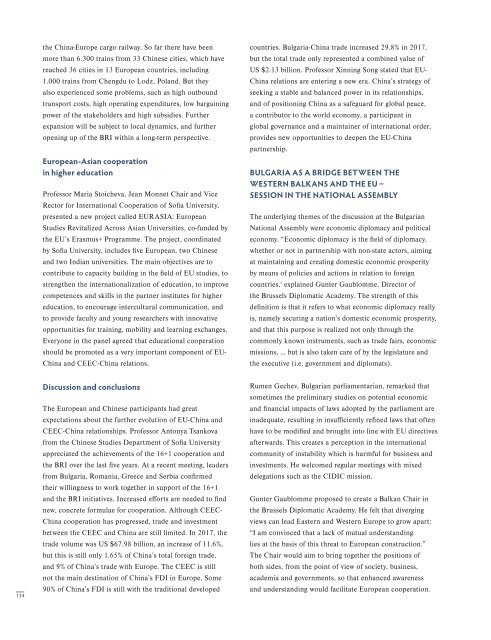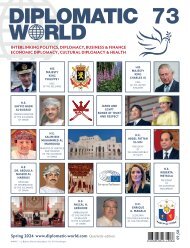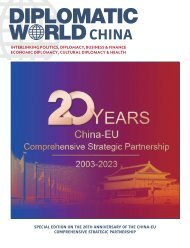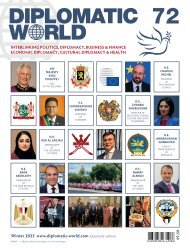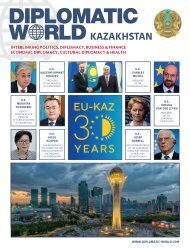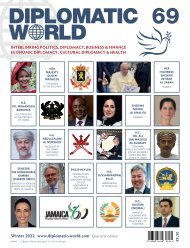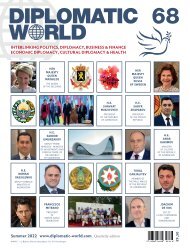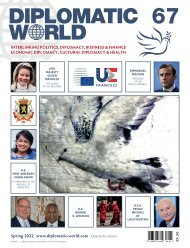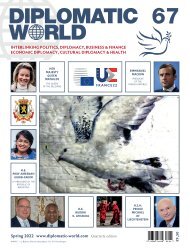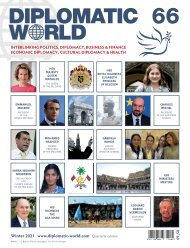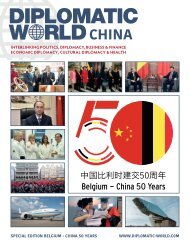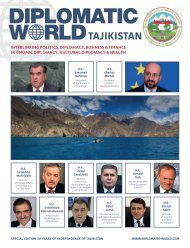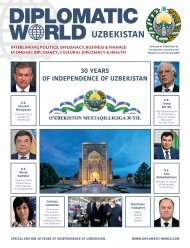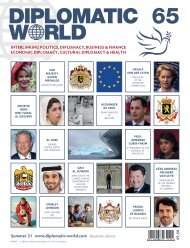Diplomatic World_nummer 57
You also want an ePaper? Increase the reach of your titles
YUMPU automatically turns print PDFs into web optimized ePapers that Google loves.
the China-Europe cargo railway. So far there have been<br />
more than 6.300 trains from 33 Chinese cities, which have<br />
reached 36 cities in 13 European countries, including<br />
1.000 trains from Chengdu to Lodz, Poland. But they<br />
also experienced some problems, such as high outbound<br />
transport costs, high operating expenditures, low bargaining<br />
power of the stakeholders and high subsidies. Further<br />
expansion will be subject to local dynamics, and further<br />
opening up of the BRI within a long-term perspective.<br />
European-Asian cooperation<br />
in higher education<br />
Professor Maria Stoicheva, Jean Monnet Chair and Vice<br />
Rector for International Cooperation of Sofia University,<br />
presented a new project called EURASIA: European<br />
Studies Revitalized Across Asian Universities, co-funded by<br />
the EU’s Erasmus+ Programme. The project, coordinated<br />
by Sofia University, includes five European, two Chinese<br />
and two Indian universities. The main objectives are to<br />
contribute to capacity building in the field of EU studies, to<br />
strengthen the internationalization of education, to improve<br />
competences and skills in the partner institutes for higher<br />
education, to encourage intercultural communication, and<br />
to provide faculty and young researchers with innovative<br />
opportunities for training, mobility and learning exchanges.<br />
Everyone in the panel agreed that educational cooperation<br />
should be promoted as a very important component of EU-<br />
China and CEEC-China relations.<br />
countries. Bulgaria-China trade increased 29.8% in 2017,<br />
but the total trade only represented a combined value of<br />
US $2.13 billion. Professor Xinning Song stated that EU-<br />
China relations are entering a new era. China’s strategy of<br />
seeking a stable and balanced power in its relationships,<br />
and of positioning China as a safeguard for global peace,<br />
a contributor to the world economy, a participant in<br />
global governance and a maintainer of international order,<br />
provides new opportunities to deepen the EU-China<br />
partnership.<br />
BULGARIA AS A BRIDGE BETWEEN THE<br />
WESTERN BALKANS AND THE EU –<br />
SESSION IN THE NATIONAL ASSEMBLY<br />
The underlying themes of the discussion at the Bulgarian<br />
National Assembly were economic diplomacy and political<br />
economy. “Economic diplomacy is the field of diplomacy,<br />
whether or not in partnership with non-state actors, aiming<br />
at maintaining and creating domestic economic prosperity<br />
by means of policies and actions in relation to foreign<br />
countries,’ explained Gunter Gaublomme, Director of<br />
the Brussels <strong>Diplomatic</strong> Academy. The strength of this<br />
definition is that it refers to what economic diplomacy really<br />
is, namely securing a nation’s domestic economic prosperity,<br />
and that this purpose is realized not only through the<br />
commonly known instruments, such as trade fairs, economic<br />
missions, … but is also taken care of by the legislature and<br />
the executive (i.e. government and diplomats).<br />
134<br />
Discussion and conclusions<br />
The European and Chinese participants had great<br />
expectations about the further evolution of EU-China and<br />
CEEC-China relationships. Professor Antonya Tsankova<br />
from the Chinese Studies Department of Sofia University<br />
appreciated the achievements of the 16+1 cooperation and<br />
the BRI over the last five years. At a recent meeting, leaders<br />
from Bulgaria, Romania, Greece and Serbia confirmed<br />
their willingness to work together in support of the 16+1<br />
and the BRI initiatives. Increased efforts are needed to find<br />
new, concrete formulae for cooperation. Although CEEC-<br />
China cooperation has progressed, trade and investment<br />
between the CEEC and China are still limited. In 2017, the<br />
trade volume was US $67.98 billion, an increase of 11.6%,<br />
but this is still only 1.65% of China’s total foreign trade,<br />
and 9% of China’s trade with Europe. The CEEC is still<br />
not the main destination of China’s FDI in Europe. Some<br />
90% of China’s FDI is still with the traditional developed<br />
Rumen Gechev, Bulgarian parliamentarian, remarked that<br />
sometimes the preliminary studies on potential economic<br />
and financial impacts of laws adopted by the parliament are<br />
inadequate, resulting in insufficiently refined laws that often<br />
have to be modified and brought into line with EU directives<br />
afterwards. This creates a perception in the international<br />
community of instability which is harmful for business and<br />
investments. He welcomed regular meetings with mixed<br />
delegations such as the CIDIC mission.<br />
Gunter Gaublomme proposed to create a Balkan Chair in<br />
the Brussels <strong>Diplomatic</strong> Academy. He felt that diverging<br />
views can lead Eastern and Western Europe to grow apart:<br />
“I am convinced that a lack of mutual understanding<br />
lies at the basis of this threat to European construction.”<br />
The Chair would aim to bring together the positions of<br />
both sides, from the point of view of society, business,<br />
academia and governments, so that enhanced awareness<br />
and understanding would facilitate European cooperation.


